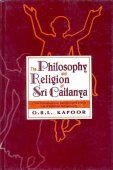Parinamavada, Pariṇāmavāda, Parinama-vada, Parīṇāmavāda: 5 definitions
Introduction:
Parinamavada means something in Hinduism, Sanskrit. If you want to know the exact meaning, history, etymology or English translation of this term then check out the descriptions on this page. Add your comment or reference to a book if you want to contribute to this summary article.
In Hinduism
Ayurveda (science of life)
Source: gurumukhi.ru: Ayurveda glossary of termsPariṇāmavāda (परिणामवाद):—[pariṇāmavādaḥ] Theory of tramsformation which states that all the substances get changes continously

Āyurveda (आयुर्वेद, ayurveda) is a branch of Indian science dealing with medicine, herbalism, taxology, anatomy, surgery, alchemy and related topics. Traditional practice of Āyurveda in ancient India dates back to at least the first millenium BC. Literature is commonly written in Sanskrit using various poetic metres.
Languages of India and abroad
Sanskrit dictionary
Source: DDSA: The practical Sanskrit-English dictionaryPariṇāmavāda (परिणामवाद) or Parīṇāmavāda (परीणामवाद).—the Sāṅkhya doctrine of evolution.
Derivable forms: pariṇāmavādaḥ (परिणामवादः), parīṇāmavādaḥ (परीणामवादः).
Pariṇāmavāda is a Sanskrit compound consisting of the terms pariṇāma and vāda (वाद).
Source: Cologne Digital Sanskrit Dictionaries: Monier-Williams Sanskrit-English DictionaryPariṇāmavāda (परिणामवाद):—[=pari-ṇāma-vāda] [from pari-ṇāma > pari-ṇam] m. the ‘doctrine of evolution’, the Sāṃkhya doctrine, [Sarvadarśana-saṃgraha]
[Sanskrit to German]
Sanskrit, also spelled संस्कृतम् (saṃskṛtam), is an ancient language of India commonly seen as the grandmother of the Indo-European language family (even English!). Closely allied with Prakrit and Pali, Sanskrit is more exhaustive in both grammar and terms and has the most extensive collection of literature in the world, greatly surpassing its sister-languages Greek and Latin.
Kannada-English dictionary
Source: Alar: Kannada-English corpusPariṇāmavāda (ಪರಿಣಾಮವಾದ):—
1) [noun] (phil.) the theory of evolution putforward in Sāṃkhya philosophy, that the physical world may be derived from a single substance which is assumed to be complex and all-pervasive.
2) [noun] the theory which holds that all species of plants and animals developed from earlier forms by hereditary transmission of slight variations in successive generations, and that natural selection determines which forms will survive; Darwiṇs theory of evolution.
Kannada is a Dravidian language (as opposed to the Indo-European language family) mainly spoken in the southwestern region of India.
See also (Relevant definitions)
Partial matches: Vada, Vata, Parinama.
Starts with: Parinamavatam.
Full-text: Parinamavadi, Satkaryavada, Parinama, Parinam, Vada.
Relevant text
Search found 21 books and stories containing Parinamavada, Pariṇāmavāda, Parinama-vada, Pariṇāma-vāda, Parīṇāmavāda, Parīṇāma-vāda; (plurals include: Parinamavadas, Pariṇāmavādas, vadas, vādas, Parīṇāmavādas). You can also click to the full overview containing English textual excerpts. Below are direct links for the most relevant articles:
Contribution of Vachaspati-Mishra to Samkhya System (by Sasikumar. B)
Chapter 3.3c - The Theory of Pariṇāmavāda (the doctrine of evolution)
Chapter 3.3 - Ontology of Sāṅkhya System (Introduction)
Shri Gaudiya Kanthahara (by Srila Bhaktisiddhanta Sarasvati)
Srila Gurudeva (The Supreme Treasure) (by Swami Bhaktivedanta Madhava Maharaja)
Talking with the Learned Scholar Vaṃśaropaṇa Siṃha < [Chapter 1.5 - Back to Home Village]
Nyaya-Vaisheshika categories (Study) (by Diptimani Goswami)
The Theory of Causation (Introduction) < [Chapter 8 - The Theory of Causation]
Satkāryavāda < [Chapter 8 - The Theory of Causation]
Samkhya thoughts in the Mahabharata (by Shini M.V.)
Theory of causation (Satkāryavāda) < [Chapter 2 - The Principles of Sāṃkhya Philosophy]
Preceptors of Advaita (by T. M. P. Mahadevan)
Related products

